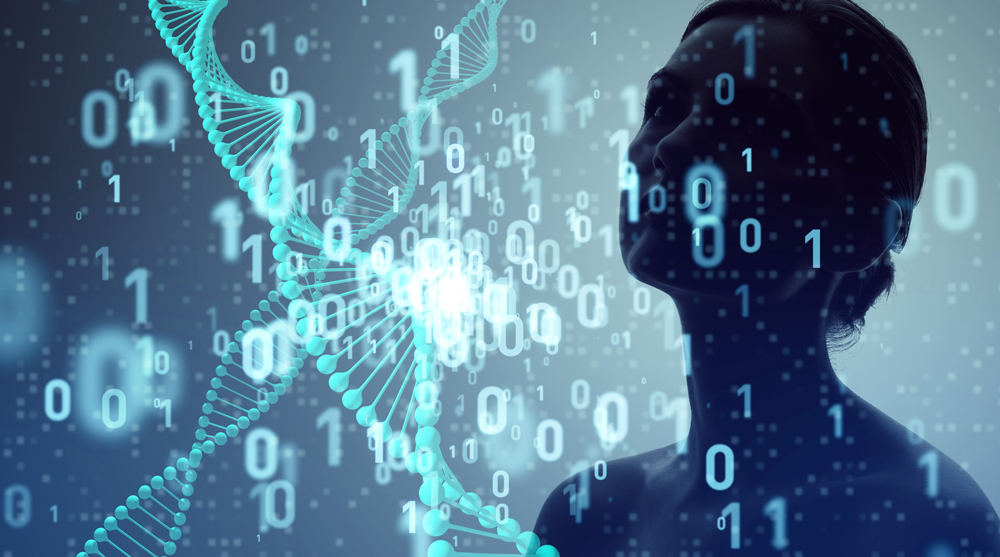By Alla Marinow, B.A., N.C., Bauman College Alumna
Genetics + You
Genetics is the new buzzword in the health industry. Initially, taking a genetic test satisfied our curiosity about our ancestral roots. Now, many people take genetic tests to determine whether they have predispositions to diseases. Some fear that the results from genetic testing are like a crystal ball and predict an imminent and unpreventable event, in this case disease, or maybe even death.
Fortunately, genetic testing is not a crystal ball—it does not predict a person’s demise now or in the future—but it can indicate a genetic predisposition to disease. It does not mean you will, or will not, get that disease to which you are predisposed. Why? Epigenetics!
What is Epigenetics?
Epigenetics is the study of biological mechanisms that switch genes “on” or “off.” What you eat, where you live, when and how much you sleep, how often you exercise, who you interact with, how much stress you encounter, and aging can all eventually cause chemical modifications around genes that will turn them “on” or “off” over time.¹
Why Are We Getting Sicker? Is it Our Genetics?
What were once considered diseases of aging have now crossed the age barrier; chronic diseases, from diabetes to cancer, have worked their way into all age groups of the population. For example, diabetes affects almost 10% of US adults today, the vast majority of which are affected by type 2 diabetes, but the problem is increasing affecting youth as well.²
So, what happened in the last 50 years to cause this increase in disease and shift to affecting a younger population? Can we point our fingers at genetics and claim that it is because of the inherited genes from parents or grandparents? Our genes have been with us since the beginning of time—so why this sudden surge with more people getting sicker at younger ages?
The answer lies in our environment and lifestyle. We are what we eat and breathe and how we live our lives. Our fast-paced society has provided us with foods designed to support our hectic lifestyles—fast foods, pre-packaged frozen foods, and snacks that satisfy our cravings. These foods are made from processed grains grown with pesticides and herbicides and animals raised on genetically modified grains—foods lacking the nutrients our bodies need. Combine this malnutrition with unrelenting stress (work, finances, family, social activities, etc.) and a genetic predisposition to a given disease, and you have the perfect storm for malfunction.

What Does Healthy Living Look Like?
Studies have looked at centenarians (people 100 years or older) in what are known as “blue zones” around the world—regions like Ikaria, Sardinia, and Okinawa where people tend to live healthier and longer lives than most. This research has studied people who have genetic predispositions to diseases (yes, the same ones we have), but who have not triggered them and live very healthy, active, and engaged lives at 100+ years of age. People living in these “blue zones” have several factors in common: nutritious foods that are usually grown or raised locally without pesticides or herbicides; daily exercise through whatever labors individuals are engaged in; meaningful social interaction with family, friends, and community; and low levels of stress. Genetics aside, these people have not only avoided triggering their genetic predispositions to disease, but they have inadvertently nurtured those weaknesses through food and lifestyle, improving their overall health.³
Since most of us live outside of these coveted “blue zones,” the question is: what can we do for ourselves and our families to stay healthy? We can’t alter our genetics (they are inherited—we were born with them), so how can a genetic assessment help us?
Nutrigenetics: Personalized Nutrition Based on Genetic Makeup
Enter nutrigenetics. Our genetics affect how we process and utilize different nutrients from food based on our genetic strengths and weaknesses (known as SNPs or single nucleotide polymorphisms). Nutrients from food can alter the expression of genes. Since each person is genetically different, not everyone’s body will react in the same way to different nutrients in their diet. While we can all benefit from eating a rainbow of colors, certain foods and nutrients can target specific genetic weaknesses. Like links in a chain, our genes are strengthened by consuming certain foods. As Hippocrates said, “Let food be thy medicine and medicine be thy food.”
Nutrigenetics is an exciting and emerging field of practice used by holistic health professionals. By using a person’s genetic profile in combination with health history, food journals, and blood tests, personalized dietary and supplement recommendations can be developed to target and correct symptoms of genetic weaknesses or prevent the development of disease.
So You’ve Taken a Genetic Test, Now What?
What can you do after taking a genetic test and finding out you are predisposed to a variety of diseases? First, don’t panic! Second, a predisposition does not necessarily mean that you will develop that disease. Third, knowledge is power! We have epigenetics and nutrigenetics on our side. Like the people living in “blue zones,” we can live a healthy lifestyle and fuel our bodies with high-quality nutrients. Knowing about our genes allows us to address these predispositions through changes in diet, supplementation, exercise, and stress management.
Since we are all genetically different, a personalized approach to addressing genetic mutations should be developed with a health professional who can make targeted recommendations for specific nutrients, supplements (if needed), and lifestyle modifications based on your genetics, health history, blood tests, and current diet. A personalized roadmap will take you a long way to correcting deficiencies, setting you on the path to healthy living and aging.

The Bottom Line
We are fortunate to be living in a time when new and innovative discoveries are being made in the healthcare industry. While scientists are still in the early stages, the future of medicine will use genetics to inform treatment plans—and some medical fields already are! Genetics is here to stay—it is ours to use to identify our own weaknesses that can be targeted and mitigated with an appropriate nutrition and lifestyle plan designed specifically for each of us.
References
- A super brief and basic explanation of epigenetics for total beginners. (2018, July 30). Retrieved from https://www.whatisepigenetics.com/what-is-epigenetics.
- Centers for Disease Control and Prevention. (2017). National Diabetes Statistics Report, 2017. Atlanta, GA: Centers for Disease Control and Prevention, US Department of Health and Human Services.
- Bland, J.S. (2014). The disease delusion: Conquering the causes of chronic illness for a healthier, longer, and happier life. New York, NY: HarperCollins Publishers.
About Alla Marinow
Alla is a graduate of Bauman College and the University of Western Ontario in Canada. Originally, Alla’s own ill health brought her to Bauman College, which facilitated reversing an autoimmune disease and addressing post cancer surgery without chemotherapy or drugs. Following graduation, she and her husband started their own company in Berkeley, CA, Be Well! Natural Health and Well-Being, which focuses on holistic healing, both nutritionally and spiritually.
As a holistic nutritionist, Alla specializes in diseases ranging from pre-autoimmune conditions, autoimmune diseases, and cancer. In her practice, she has found that genetics make up about 25% of the missing piece of the health puzzle. By combining health history, food journals, blood work, and genetics, practitioners can provide a truly individualized program to set a client on a healing path. While nutrigenetics is a relatively new field, it helps to improve outcomes, avoid the pitfalls of hit-and-miss supplementation, correct nutritional deficiencies, and advance healing for clients with complex situations.
